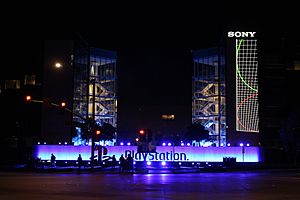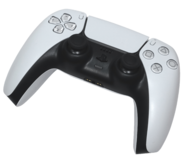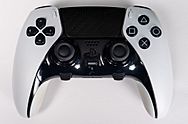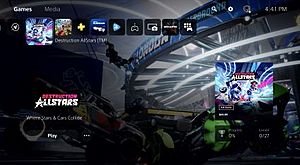PlayStation 5 facts for kids
The PlayStation 5 (PS5) is a super cool home video game console made by Sony Interactive Entertainment. It's the newest PlayStation console after the PlayStation 4. The PS5 came out on November 12, 2020, in some parts of the world, and then everywhere else a week later. It's part of the newest group of game consoles, like the Xbox Series X/S.
There are two main kinds of PS5. One has a special disc drive that can play Ultra HD Blu-ray discs, which are like super high-quality DVDs for games and movies. The other one, called the Digital Edition, doesn't have a disc drive. You can only buy and download games for it online. Both versions came out at the same time. Later, in November 2023, Sony released thinner versions of both consoles.
The PlayStation 5 has some awesome features. It has a super-fast solid-state drive (SSD) that helps games load much quicker. It also has a powerful graphics chip (called a GPU) that can show games in amazing 4K resolution and make them look super smooth. Plus, it has special technology called ray tracing for realistic lights and reflections, and something called the Tempest Engine for cool 3D audio effects. The PS5 also comes with the DualSense controller, which has special vibrations that make games feel more real. You can also play most PlayStation 4 and PlayStation VR games on the PS5, and it works with the new PlayStation VR2 headset.
 |
|
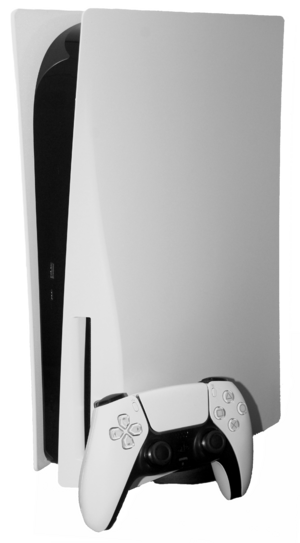
The original PlayStation 5 console with optical drive, and DualSense controller
|
|
| Also known as | PS5 |
|---|---|
| Developer | Sony Interactive Entertainment |
| Manufacturer | Sony, Foxconn |
| Product family | PlayStation |
| Type | Home video game console |
| Generation | Ninth |
| Release date |
|
| Lifespan | 2020–present |
| Introductory price | |
| Units sold | 50 million (as of 20 December 2023[update]) |
| Units shipped | 46.6 million (as of 30 September 2023[update]) |
| Media | |
| CPU | Custom 8-core AMD Zen 2 Variable frequency up to 3.5 GHz |
| Memory | 16 GB/256-bit GDDR6 SDRAM 512 MB DDR4 RAM (used as SSD controller cache) |
| Storage | Custom 825 GB PCIe 4.0 NVMe SSD 1 TB in 2023 version |
| Removable storage | Internal PCIe 4.0 NVMe M.2 SSD upgradeable up to 8TB External USB-based HDD or SSD up to 8TB |
| Display | |
| Graphics | Custom AMD RDNA 2 36 CUs Variable frequency up to 2.23 GHz 10.3 TFLOPS peak |
| Sound |
|
| Controller input | DualSense, DualShock 4, PlayStation Move, PS5 Media Remote, PlayStation VR2 Sense controllers |
| Connectivity |
|
| Online services | PlayStation Network PlayStation Plus |
| Dimensions |
|
| Mass |
|
| Best-selling game | Marvel's Spider-Man 2 (5 million) |
| Backward compatibility |
Almost all PlayStation 4 and PlayStation VR games |
| Predecessor | PlayStation 4 |
Contents
History of the PS5
How the PS5 was Made

The main designer of PlayStation consoles, Mark Cerny, often asked game makers what they liked and didn't like about the PlayStation 4. He used their ideas to make the next console better. One big problem was how long games took to load. Game creators told him that slow loading times made it hard to make bigger and more detailed games.
So, a main goal for the PS5 was to make games load super fast. This helps a lot in games where new areas appear as you move around. Sony decided not to make a cheaper, less powerful PS5 version. They believed a console should be powerful enough to last a long time.
When the PS5 Came Out
Mark Cerny first talked about the new console in April 2019. Sony later said the console would be released by the end of 2020. They showed off the console's look and games in June 2020.
The PlayStation 5 was launched on November 12, 2020, in some countries like Australia, Japan, and North America. It came out in most other parts of the world a week later, on November 19, 2020.
When it launched, there were two versions: one with a disc drive and one without. The version without the disc drive was a bit cheaper because you could only download games. People were very excited, and pre-orders sold out super fast! Sony even apologized because it was hard for everyone to get one.
PS5 Hardware and Design
Inside the PS5 Console
The PlayStation 5 has special parts made by AMD and Sony working together. It has a powerful main processor (called a CPU) with 8 cores that runs very fast. It also has a strong graphics processor (called a GPU) that helps games look amazing. This GPU can make graphics look super realistic with something called ray tracing, which creates lifelike lighting and reflections. The console also has 16 GB of super-fast memory (RAM).
The PS5 has a special cooling system to keep it from getting too hot. It uses a big fan and a large heat sink to move heat away. There's even a special liquid metal material that helps cool the main chip. This design helps the PS5 run quietly and efficiently.
The console also has a new sound technology called the Tempest Engine. This allows games to have hundreds of different sounds playing at the same time, making the audio feel much more immersive and 3D.
Super-Fast Storage
One of the coolest things about the PS5 is its custom-built 825 GB solid-state drive (SSD). This SSD is incredibly fast, much faster than older hard drives. This means games load almost instantly, and you can jump into the action much quicker. Game creators really wanted this speed to make bigger and more detailed game worlds.
You can add more storage to your PS5 if you need it! You can put an extra internal NVM Express (NVMe) M.2 solid-state drive (up to 8TB) inside the console. You can also connect an external USB hard drive or SSD (up to 8TB) for more space. While PS4 games can be played directly from an external USB drive, PS5 games need to be on the internal SSD or an internal M.2 drive to run.
The PS5 with the disc drive can play Ultra HD Blu-ray discs, which can hold up to 100 GB of game data. This is a lot more than the 50 GB discs used for PS4 games. For example, the game Gran Turismo 7 comes on two discs for PS4 but only one for PS5.
How the PS5 Looks
The PS5 has a unique two-tone design, matching the DualSense controller. It has a black center with two white "wings" on the sides, lit up with cool blue lights. You can stand the console up or lay it down. The white side panels can be removed, which helps with cleaning dust and adding extra storage.
The PS5 is known for being quite large compared to older consoles. This size helps make sure the console stays cool and quiet while you're playing.
On the front, it has a USB-C port and a regular USB port. On the back, it has more USB ports, an HDMI 2.1 port (for connecting to your TV), an Gigabit Ethernet port (for internet), and the power plug.
DualSense and DualSense Edge Controllers
The DualSense wireless controller for the PlayStation 5 was shown in April 2020. It's similar to the old DualShock controller but with some cool new features. The DualSense has "adaptive triggers" that can change how hard they are to press. This means if you're pulling a bowstring in a game, the trigger might feel tighter, making it more realistic! It also has special "haptic feedback" vibrations that are more detailed than regular rumble.
The DualSense has a "Create" button instead of "Share," which helps you make and share game content easily. It also has a built-in microphone so you can chat with friends without a headset. The controller uses USB-C for charging and has a better battery. As a fun secret, the texture of the controller is covered in tiny PlayStation button symbols (cross, circle, square, triangle).
Sony also released the DualSense Edge controller in 2023. This is a more advanced controller that lets you change parts, like the stick modules, and save different control settings.
PS5 Console Updates
Sony has released different versions of the PS5 hardware. In August 2021, they made a slightly lighter version by changing the cooling system. In August 2022, they made another version that was even lighter and used less power.
In November 2023, Sony released a new, smaller version of the PS5, sometimes called the PlayStation 5 Slim. These new models are smaller than the original PS5 and have 1 TB of storage. If you get the Digital Edition of the Slim, you can buy a separate disc drive later and attach it to the console!
Other PS5 Accessories
There are other cool accessories for the PS5. These include a charging station for your DualSense controllers, a new HD camera, and a remote control for media like movies. The Pulse 3D wireless headset works great with the PS5's 3D audio.
The PS5 can also use most of your old PS4 controllers and accessories, but usually only for PS4 games. Things like Rock Band instruments, PlayStation Move controllers, and racing wheels often work with PS5 games too.
PlayStation VR2
Sony announced the PlayStation VR2 (PS VR2) in January 2022. This is a new virtual reality headset for the PlayStation 5. It has amazing screens that show games in 4K resolution with HDR (High Dynamic Range) for super bright colors. It also comes with two Sense controllers that have special tracking, haptic feedback, and adaptive triggers, just like the DualSense controller.
The PS VR2 headset can even track your eye movements, which helps make games look better and adds new ways to play. Unlike the first PlayStation VR, the PS VR2 doesn't need outside cameras. It uses cameras built into the headset to track your movements. It connects to the PS5 with just one USB-C cable.
The PS VR2 came out on February 22, 2023. Some games available at launch included Horizon Call of the Mountain, Gran Turismo 7, and Resident Evil Village. Keep in mind that games made for the first PS VR usually need to be updated by the game makers to work on PS VR2.
PS5 System Software
The PlayStation 5's menu system is designed to be easy to use and full of helpful information. It shows you what your friends are doing, multiplayer games you can join, and missions you can complete in single-player games. The idea is that you don't have to start a game to see what's new. Everything is right there on the menu!
The PS5 menu looks very modern and runs super fast. It's a big change from the PS4's menu. When you turn on the PS5, you see a cool animation and a new login screen. The main screen shows your games and media apps. If you pick a game, you can see specific activities, like a certain level or multiplayer mode. The PlayStation Store is also built right into the menu, so it's easy to find new games.
A new feature is the Control Center, which you open by pressing the PS button. It shows you cards with suggestions based on what you're playing or what you've done recently. For example, it might show your progress in a mission or list challenges you can try. This helps you quickly see what you can do in a game, especially if you don't have a lot of time to play.
The PlayStation 5 supports many streaming services like Netflix and YouTube. You can also use Sony's Remote Play app to play your PS5 games on other devices like phones or computers over your home network.
Software Updates for the PS5
Sony regularly releases updates for the PS5's software. In April 2021, an update allowed users to move PS5 games to an external USB hard drive. This helps free up space on the main internal storage. However, to play the games, they still need to be moved back to the internal SSD.
In September 2021, a big update added support for expanding the internal storage with an M.2 SSD. It also brought new features like a better trophy tracker and 3D audio support for TV speakers.
In October 2021, Sony started "Game Trials" in some areas. This lets you download and play the full version of certain games for a limited time. After the trial, you need to buy the game to keep playing.
In March 2022, an update added voice commands. If you're in the United States or United Kingdom, you can say "Hey, PlayStation" and then a command to control your PS5. This update also improved accessibility features and the Game Base, which helps you manage your friends and parties.
Later updates in 2023 added support for VRR at 1440p resolution, which makes games look smoother. They also added the ability to transfer data between PS5 consoles and support for voice chat using Discord. The PS5 can now use an M.2 SSD with a maximum capacity of 8 TB, and you can even mute the start-up beep sound!
Games on PS5
Every PlayStation 5 console comes with Astro's Playroom already installed. This game is designed to show off all the cool features of the DualSense controller. Games on the PS5 are not "region-locked," meaning you can play games from any country on your console.
Sony wants to make sure that PS5 games use all the new features of the console. Games like Ratchet & Clank: Rift Apart are great examples of games that can only be made on the PS5 because of its power. While some new games are also made for PS4, Sony encourages game makers to create games that truly use the PS5's advanced abilities.
Playing Older Games (Backward Compatibility)
The PS5 is designed to be backward compatible with almost all of the more than 4,000 games from the PlayStation 4 library. This means you can play most of your old PS4 games on your new PS5! It also works with PlayStation VR games.
Because the PS5 has a super-fast SSD and more power, many PS4 games will load faster and might even run smoother or look better on the PS5. You can move your saved game files from your PS4 to your PS5 using cloud storage or a USB drive, so you don't lose your progress.
Most downloaded PS4 games will show up in your library on the PS5 and can be downloaded. You can also copy them from a USB hard drive or over Wi-Fi.
There are only a few PS4 games that don't work on the PS5. As of December 2021, these include Afro Samurai 2: Revenge of Kuma Volume One, Hitman Go: Definitive Edition, Just Deal With It!, Robinson: The Journey, Shadwen, and We Sing.
Images for kids
See also
 In Spanish: PlayStation 5 para niños
In Spanish: PlayStation 5 para niños


